If you are considering graduating with an MBA degree from the United States, you will most likely have these three goals in mind:
- Find a job
- Get an H-1B visa
- Convert your H-1B to a Green Card
For the last five years, most Business school graduates from top business schools have enjoyed a healthy job market, rising salaries, and comparatively high approval rates for H1b visas.
During the 2020 U.S. Presidential elections, the American people voted for Joe Biden to be the next U.S. President. So, what will this election result mean for international students, especially in the 90% economy?
To make this prediction, let us first look at data to understand what MBA graduates experienced during the Trump administration and then anticipate what they can expect from the Biden administration.
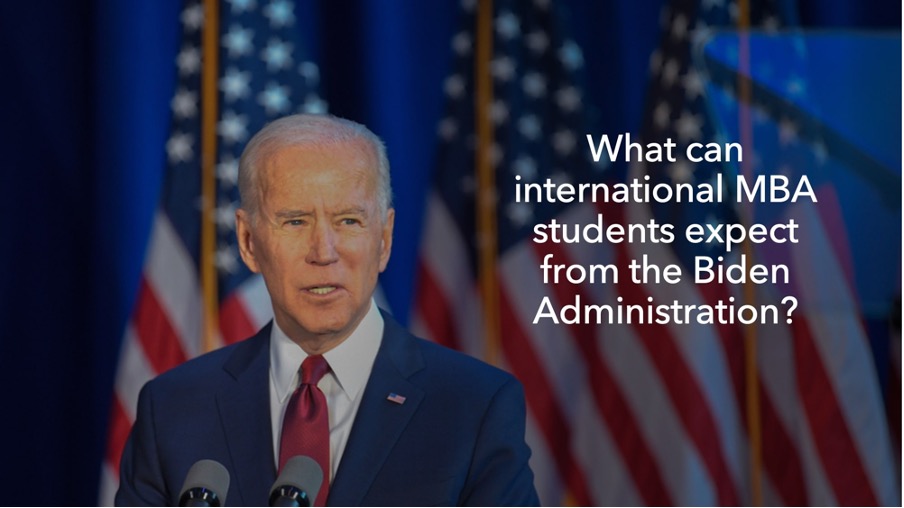
MBA during the Trump administration
A strong economy with Record employment and salaries
According to Congresswoman Carolyn Maloney, Vice-Chair of the ‘Joint Economic Committee,’ Trump inherited a strong economy from President Obama.
The two key metrics from this report are highlighted below:
- Unemployment: Under Obama, unemployment was cut from a recession-peak of 10 percent to only 4.7 percent. It has continued to drop and now is extremely low at 3.6 percent.
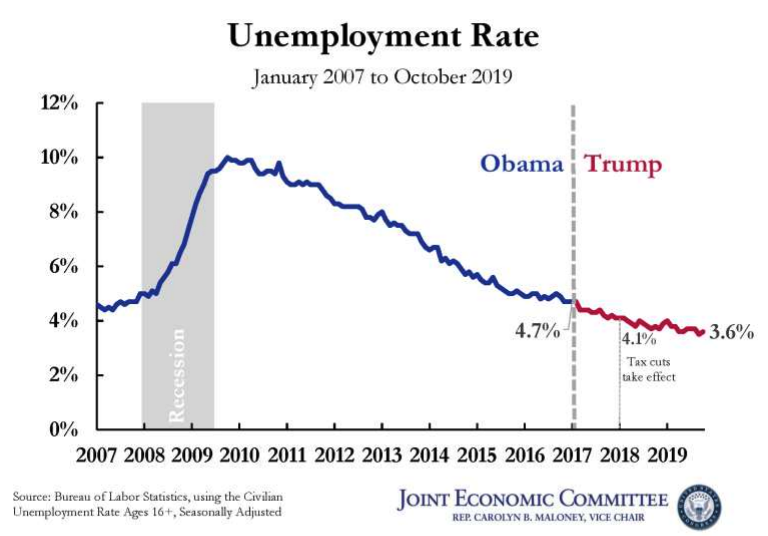
- Job growth: By the end of the Obama administration, the economy had experienced 76 consecutive months of job growth. Since Trump became President, the streak has been extended to 109 consecutive months.
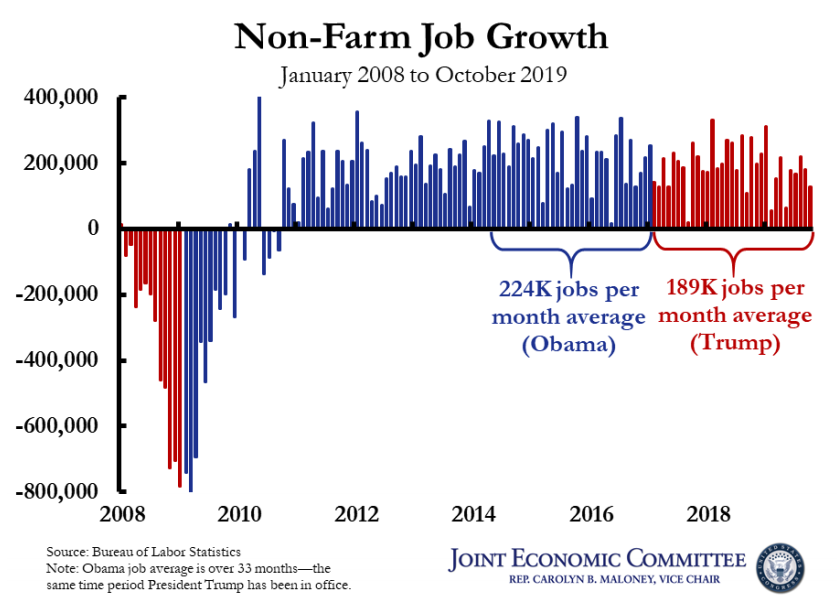
Business Schools employment figures
Since the economy was growing, the job market expanded and positively affected MBAs. This trend was evident in the employment reports published by some of the top business schools.
| Business School | 2020 | 2019 | 2018 | 2017 |
| Wharton | 93.50% | 98.50% | 98.40% | 97.10% |
| Stanford GSB | NA | 94% | 95% | 92% |
| Harvard Business School | 90% | 94% | 95% | 95% |
| Columbia Business School | 90% | 93.90% | 94.10% | 93.20% |
| Chicago Booth | 92.8% | 96.3% | 96.3% | 97.1% |
| Dartmouth Tuck | 94% | 98% | 96% | 89% |
| Kellogg | 93.9% | 97.5% | 95% | 94.1% |
| MIT Sloan | 95.5% | 95.7% | 97% | 93.9% |
| Duke Fuqua | 93% | 97% | 98% | NA |
| Yale SOM | 85.9% | 91.4% | 89.8% | 90.5% |
The percentage of class securing employment within three months of graduating increased from 2017 to 2019 for nearly all business schools and these numbers did not drastically fall but stayed incredibly strong in 2020 despite a worldwide recession.
What about international students?
International students continued to find jobs even in the 90% economy. The table below shows employment statistics reported by top business schools in their official employment reports for international students.
| Business School | 2020 | 2019 | 2018 |
| Stanford GSB | NA | 94% | 94% |
| Chicago Booth | 91.20% | 97% | 95.20% |
| Dartmouth Tuck | 91% | 97% | 94% |
| Michigan Ross | 84.50% | 95.40% | 90.40% |
| Duke Fuqua | 91% | 86% | 92% |
| Darden | 91% | 94% | 85% |
| Georgetown McDonough | 91% | 92% | 98% |
More than 90% of international students were able to find jobs within three months of graduating. With most schools reporting higher salaries in 2020 than in 2019, most international students did exceptionally well despite the recession, as evident from the below table.
| Business School | Median Salary 2020 | Median Salary 2019 | Median Salary 2018 |
| Harvard Business School | $150,000 | $148,750 | $140,000 |
| Wharton | $150,000 | $150,000 | $135,000 |
| Chicago Booth | $150,000 | $145,000 | $130,000 |
| Kellogg | $141,576 | $140,000 | $130,000 |
| MIT Sloan | $150,000 | $140,000 | $135,000 |
| Columbia Business School | $150,000 | $150,000 | $130,000 |
| UC-Berkeley Haas | $140,000 | $140,000 | $125,000 |
| Dartmouth Tuck | $150,000 | $140,000 | $130,000 |
| Yale SOM | $140,000 | $130,000 | $127,100 |
| Virginia Darden | $140,000 | $135,000 | $130,000 |
| Michigan Ross | $135,000 | $129,000 | $125,000 |
| Stanford GSB | Not Released | $150,000 | $142,000 |
The data has been taken from the business schools’ official employment report.

Increased Application Volume
GMAC Application Trend Report 2020 suggests that there has been an increase in application volume, especially for US MBA programs. 70% of MBA programs reported an increase in application volume in20 as compared to just 33% of MBA programs in 2019.
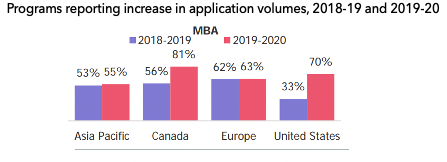
But why?
There are two reasons for the increase. First, post-Covid economy growth is expected to be more robust, and MBAs will continue to thrive in a plentiful and growing job market. The second reason and a more prominent one for MBAs is the H-1B visa policy.
In 2019 when the Department of Homeland security announced a rule change for the H-1B lottery process, it ended up favoring candidates with advanced degrees, allowing more candidates with advanced degrees to secure jobs.
This fact is evident from the USCIS report on approved H-1B petitions.
In FY 2019, more than 53% of the beneficiaries in the approved H-1B petitions have a Master’s degree. About 35% have a Bachelor’s degree, 7.6% have a Doctoral degree, and 3.3% have a professional degree. Fewer than 1% of the beneficiaries from the approved petitions have other educational attainments.
Moreover, the higher H-1B denial rate of Indian I.T. companies opened more opportunities for MBA graduates.
Data from a Forbes Magazine article shows that during the Trump administration, the H-1B denial rates skyrocketed for Indian I.T. companies and increased for American Tech companies. This data alludes to a welcome change for MBA graduates as companies which typically employ MBA graduates tend to have a lower H-1B denial rate
| Employer | F.Y. 2020 H-1B Denial Rate | F.Y. 2015 H-1B Denial Rate | Denial Rate Change in % Points F.Y. 2015 to F.Y. 2020 |
| Amazon | 15% | 1% | 14 |
| 15% | 1% | 14 | |
| TCS | 15% | 6% | 9 |
| Microsoft | 12% | 1% | 11 |
| Deloitte | 41% | 18% | 23 |
| Cognizant | 52% | 8% | 44 |
| 7% | 0% | 7 | |
| IBM | 19% | 3% | 16 |
| Apple | 9% | 2% | 7 |
| Intel | 7% | 1% | 6 |
| Tech Mahindra | 32% | 4% | 28 |
| Capgemini | 33% | 5% | 28 |
| Larsen & Toubro | 27% | 2% | 25 |
| Infosys | 59% | 2% | 57 |
| Cisco | 13% | 1% | 12 |
| Accenture | 31% | 4% | 27 |
| Qualcomm | 5% | 0.4% | 5 |
| Wipro | 39% | 7% | 32 |
| PricewaterhouseCoopers | 20% | 1% | 19 |
| Oracle | 19% | 1% | 18 |
| Ernst & Young | 23% | 0.3% | 23 |
| Uber | 25% | 2% | 23 |
| Wal-Mart | 16% | 3% | 13 |
| JPMorgan Chase | 3% | 1% | 2 |
| HCL America | 37% | 2% | 35 |
As you can see, the denial rate for H-1B visas for I.T. companies has increased to more than 30% in 2020 from less than 10% in 2015. Infosys, the IT giant saw its H-1B denial rate increase from a mere 2% in 2015 to 59% in 2020.
When it comes to American companies that typically employ MBAs, there is no denying that their H-1B denial rates have increased in 2020 compared to 2015. However, the increase is not at all, comparable to the denial rates of I.T. companies.
What did it mean for MBA graduates?
- This signifies a shift in the future H-1B visa policy from quantity to quality, and this is where the MBA graduates from U.S. business schools have an edge.
- Higher H-1B denial rates of I.T. companies will provide more opportunities for international MBA graduates to get an H-1B visa.
Trump’s tightening of H-1B visa rules to support his ‘America First’ agenda did pose a challenge for MBA graduates during his administration. However, despite an increased H-1B denial rates in American companies, the hiring in business schools was strong in the Technology and Consulting industries, with more than 40% of the class getting employed in these industries.
Now comes the Biden Administration
During his campaign, Joe Biden promised to do away with the H-1B suspension, expand the number of available visas, and even do away with country quotas for green cards—the reason most foreigners have to wait for several decades to get one.
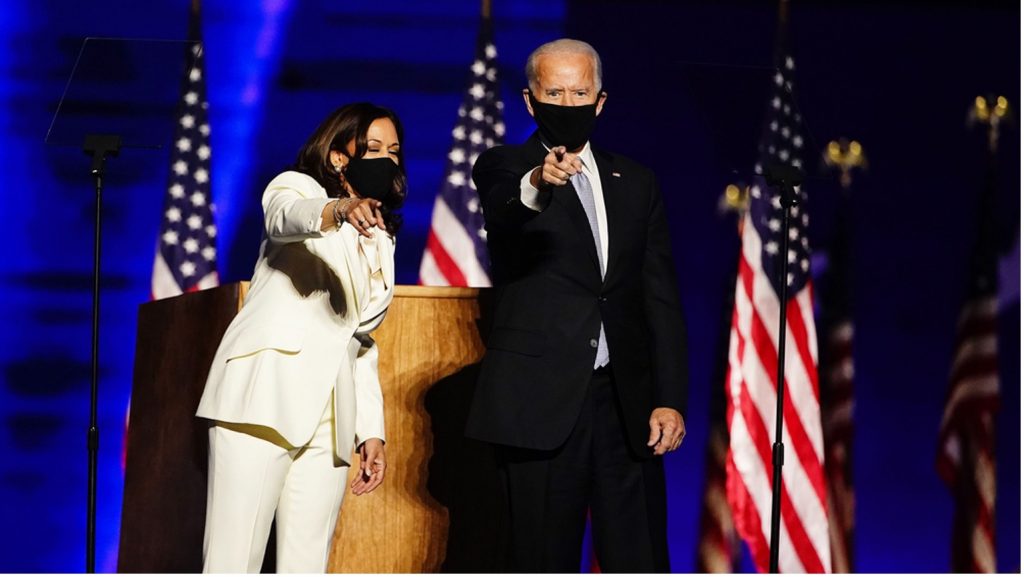
Biden has also said he will ensure that international students getting Ph.D. degrees in science, technology, engineering, and math (STEM) in the U.S. are exempt from visa caps, and that green cards are automatically doled out to those getting doctorates.
An announcement (excerpt below) made by Biden in his policy document could be directly beneficial to MBA graduates.
“High skilled temporary visas should not be used to disincentivize recruiting workers already in the U.S. for in-demand occupations,” the Biden plan on immigration said.
“An immigration system that crowds out high-skilled workers in favor of only entry-level wages and skills threatens American innovation and competitiveness.”
“Biden will work with Congress to first reform temporary visas to establish a wage-based allocation process and establish enforcement mechanisms to ensure they are aligned with the labor market and not used to undermine wages,” it added.
From this statement, one can interpret that, it is likely that companies will be asked to not give employment preference on account of low wages (which was happening in the IT sector) and this might bolster employment opportunities for international MBA graduates in the coming years.
With a strong job market, record salaries, STEM certified MBA degrees – and three-year OPTs, MBA graduates in tech and consulting have enjoyed some of the highest salaries.
With Biden becoming President – International graduates will likely attract more employers, get a chance to explore other industries such as CPG, Energy, Healthcare, etc and have a more defined path from H1B visa to Green card and a greater certainty of getting a green card, especially those who earn upwards of USD 120,000.















